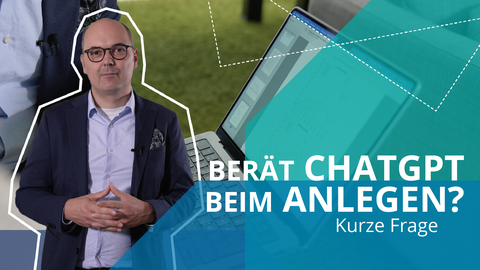Nov 30, 2023
ChatGPT-4 as a financial advisor: How AI supports investment decisions
For many investors, choosing a suitable investment is a major challenge. Professor Lars Hornuf from TU Dresden has investigated whether and to what extent AI tools such as ChatGPT can advise us on investment decisions. The results show that the portfolio suggestions made by artificial intelligence are comparable to those of professional investment advisors.
Deciding on an investment is a complex matter that can quickly overwhelm investors. It is therefore not uncommon for investors to make costly mistakes or rely on the recommendation of an investment advisor. “However, financial advisors are often subject to conflicts of interest and recommend products from which they earn more. These are not necessarily the best products for their clients,” explains Lars Hornuf, who heads the Chair of Business Administration, esp. Finance and Financial Technology at TU Dresden.
Together with researchers from the KU Eichstätt-Ingolstadt and Hochschule Bremen – City University of Applied Sciences, the economist has investigated the extent to which AI tools such as GPT-4 can contribute to unbiased financial advice, increase the level of information available to investors and improve investment results. The researchers based their analysis on the assumption that poorly informed investors should pursue a simple, passive investment strategy. In essence, this means that investors should focus on a broadly diversified market portfolio and hold on to it. The researchers' hypothesis: GPT-4 could help sift through and better understand the large amounts of information that might otherwise overwhelm investors when making decisions.
To investigate whether GPT-4 can provide individually tailored portfolio recommendations, the research team collected a total of 48 hypothetical investor profiles. The suggested products were all low-cost exchange-traded funds (ETFs) managed by well-known asset managers. Portfolio proposals from the automated financial advisory service of an established US financial advisory company served as the benchmark.
The results of the study show that GPT-4 makes portfolio suggestions in similar regions and asset classes as professional investment advisors. In doing so, GTP-4 is capable of taking into account the risk tolerance, investment horizon and age of the investor profile. The acceptance of GPT-4 as a financial advisor could increase due to the fact that GPT-4 justifies why it recommends a certain investment. “GPT-4 was not specifically trained for financial advice, but it nevertheless delivers very reasonable results for this task,” says Lars Hornuf, summarizing the results of the study. The financial economist already has follow-up studies in mind: “As a next step, we would also like to implement Large Language Models in robots and test whether this influences an investor's investment decision. We assume that investors pretend to be less of an expert in front of a robot in order to maintain a positive self-concept. As a result, they are likely to take fewer risks and make better investment decisions overall.”
Lars Hornuf talks about the study in TU Dresden's “Kurze Frage” (“Quick question”) video series:
Link to the paper: https://ssrn.com/abstract=4499485
Media inquiries:
Prof. Lars Hornuf
Chair of Business Administration, esp. Finance and Financial Technology
Faculty of Business and Economics
Tel.: +49 351 463-35572

